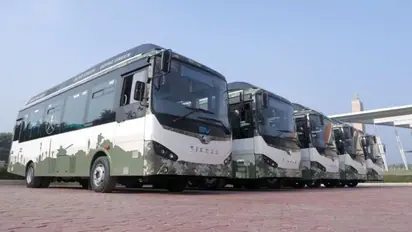Indian Army inducts electric buses for troop movement (WATCH)

Synopsis
Indian Army has already been utilising electric cars since 2019 and this initiative will provide further impetus to the “Go Green” initiative, the Indian Army said in a statement
Indian Army has inducted electric buses for troop movement within Delhi and the National Capital Region. On behalf of the Indian Army, Army Vice Chief Lt Gen MV Suchindra Kumar was handed over the electric buses by VE Commercial Vehicle Ltd at the Manekshaw Centre in New Delhi. Indian Army has already been utilising electric cars since 2019 and this initiative will provide further impetus to the “Go Green” initiative, the Indian Army said in a statement.
The handover occurred a day following Minister of State for Defence, Ajay Bhatt's announcement to Parliament regarding the Indian Army's proposal for the phased induction of electric vehicles (EVs) in 'peace stations' across the nation. The objective is to leverage modern technological advancements, promote green energy, and reduce reliance on fossil fuels, he emphasized.
In line with this initiative, the Indian Army is introducing electric light vehicles, electric buses, and electric motorcycles at peace stations.
Also to recall, in 2023, the Defence Ministry issued a Request for Proposal (RFP), aiming to procure 439 light EVs alongside 35 fast chargers. The procurement will be distributed between the Indian Army and Indian Air Force, with 415 and 24 vehicles allocated, respectively. Additionally, the fast chargers will be divided equally between the two services, with each receiving 29 and six units, respectively. The procurement will adhere to the Buy (Indian-IDDM) category, mandating a minimum indigenous content of 50%.
The RFP specified requirements for the light vehicle, including a 4-wheel, 5-door configuration capable of accommodating five individuals with rear storage space. The EV must feature a permanent magnet synchronous motor with a minimum rated power of 100 kW, an ARAI range of at least 400 km, and an onboard charger with a capacity of at least 2.5 kW.
Furthermore, the fast charger should boast a minimum capacity of 50 kW and be capable of charging the battery pack from 0-80% in 60-90 minutes. Specifications also include a battery pack and motor life of at least eight years/1,60,000 km, a top speed of no less than 120 kmph, and the ability to climb a gradient of 15 degrees in fully laden condition, with a maximum payload of 900 kg.
Stay updated with the Breaking News Today and Latest News from across India and around the world. Get real-time updates, in-depth analysis, and comprehensive coverage of India News, World News, Indian Defence News, Kerala News, and Karnataka News. From politics to current affairs, follow every major story as it unfolds. Get real-time updates from IMD on major cities weather forecasts, including Rain alerts, Cyclone warnings, and temperature trends. Download the Asianet News Official App from the Android Play Store and iPhone App Store for accurate and timely news updates anytime, anywhere.